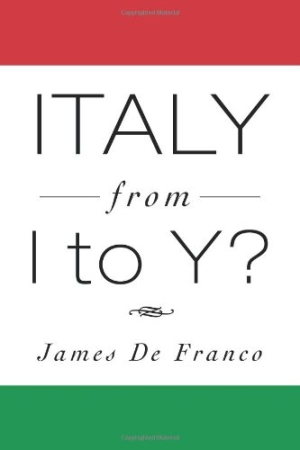Italy from I to Y?
A longing for the land of his birth entwines De Franco’s memoir with entertainment and charm.
James De Franco’s Italy from I to Y? reflects the gritty life in a little-known region of southern Italy called the Three Silas during and immediately after World War II. This Italy bears little resemblance to popular tours through Tuscany or the romanticism of Rome. De Franco’s world in the villages of Aprigliano, Laino, and Sapri reflects the poverty of a war-torn Italy: the bedroom with one lightbulb, latrines in abandoned buildings, and roads without cars.
The book takes the structure of a series of remembrances about events De Franco witnessed and experiences he endured during his youth. He relies on his ability to listen and his inability to speak. He does not reveal whether his lack of speech is psychological or physiological, but he admits that a quiet boy is frequently ignored and learns much by observation.
The stories provide glimpses of small-town Italian culture: a pig roast, a chicken shoot, and the work ethic needed to grow grapes and produce wine. He earns extra money for his family by running errands to buy cheap unfiltered Italian cigarettes. Throughout the book, De Franco employs Italian phrases and translates them accurately, enhancing the narrative and giving a reader a familial feeling of being there and witnessing events from the viewpoint of an impressionable child.
In his early twenties, De Franco emigrated to Australia, but even the stories from Down Under reflect a longing for the land of his birth. His adopted country and its unique English dialect are reflected in how De Franco spells many English words.
While the stories are engaging and charming, the narrative style can be awkward. De Franco refers to his ears as “a transitory relaying organ” and often ends lists of items with “etc.” Many sentences contain unnecessary semicolons, and some paragraphs run on for a page or two. Some sentences are missing words, and some words have extra letters. Sometimes the use of a pronoun is unclear, and an additional sentence necessarily clarifies the meaning. An editor and proofreader would have made the writing more professional and the reading more enjoyable.
Nevertheless, De Franco’s commentaries on language, culture, virtue, and love of country are inspiring. The title of the book ends with a question mark—itself a bit inscrutable—but the overall impact of the memoir is the enjoyment De Franco feels as he discovers why he is who he is.
Reviewed by
Thomas H. Brennan
Disclosure: This article is not an endorsement, but a review. The publisher of this book provided free copies of the book and paid a small fee to have their book reviewed by a professional reviewer. Foreword Reviews and Clarion Reviews make no guarantee that the publisher will receive a positive review. Foreword Magazine, Inc. is disclosing this in accordance with the Federal Trade Commission’s 16 CFR, Part 255.

